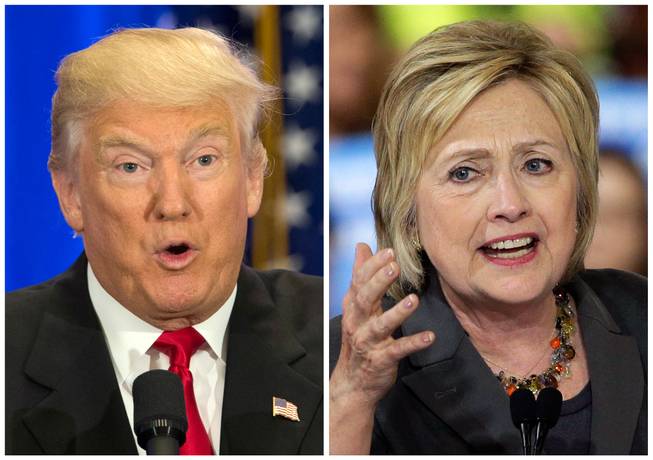
Mary Altaffer, Chuck Burton / AP
This photo combo of file images shows U.S. presidential candidates Donald Trump, left, and Hillary Clinton.
Monday, Sept. 19, 2016 | 2 a.m.
How to watch
Debates will be broadcast live on major networks (ABC, CBS, FOX and NBC), on C-SPAN and on certain cable news channels (including CNN and MSNBC). The debate also will be live-streamed.
Debate No. 1
• When: 6-7:30 p.m. PDT Sept. 26
• Where: Hofstra University, Hempstead, N.Y.
• Moderator: Lester Holt, NBC
• Format: The debate will be divided into six 15-minute sections, each focusing on a major topic. Moderators will open each segment with a question, with the candidates each getting two minutes to respond. The candidates will then have an opportunity to respond to each other, and the moderator can use the rest of the time to further explore the topic. The topics are supposed to be announced at least one week before the debate but had not been released as of publication time.
Vice presidential debate
• When: 6-7:30 p.m. PDT Oct. 4
• Where: Longwood University, Farmville, Va.
• Moderator: Elaine Quijano, CBS
• Format: Like the first presidential debate, the vice presidential debate will be divided into segments. There will be nine segments of 10 minutes each. Candidates will have two minutes to respond to the question, and the moderator can use the rest of the time to further explore the topic.
Debate No. 2
• When: 6-7:30 p.m. PDT Oct. 9
• Where: Washington University, St. Louis
• Moderators: Martha Raddatz, ABC, and Anderson Cooper, CNN
• Format: The second debate will be formatted like a town-hall meeting, with half the questions asked by audience members and the other half asked by the moderators, based on input from social media. Candidates will again have two minutes to respond to the questions, with an extra minute for additional discussion.
Debate No. 3
• When: 6-7:30 p.m. PDT Oct. 19
• Where: UNLV
• Moderator: Chris Wallace, Fox
• Format: The third and final debate’s format will be the same as the first debate’s.
On June 16, 2015, two months after Hillary Clinton declared her candidacy for the U.S. presidency, Donald Trump did the same.
Now, after 15 months of attacks and counterattacks, the nominees will face each other for the first time as their respective party’s nominees when they meet Sept. 26 on a debate stage at Hofstra University on Long Island., N.Y.
Though many considered a recent town hall hosted by NBC’s Matt Lauer as the first clash between the two candidates, the Monday night debate will mark the first time Trump and Clinton appear on a stage together.
The town hall offered a glimpse into what the three presidential debates might look like over the next few weeks. That glimpse, critics said, wasn’t so pretty.
Recaps criticized Trump for being too vague in his answers, and Clinton for appearing “stilted.” Their performances highlighted some of the candidates’ weak points — and the value of having a good moderator, as Lauer was widely panned for being unfair and even sexist.
It was thought that Clinton faced tougher, more pointed questions on her record, that she was put on the defensive, but also that she gave more specific, detailed answers. Meanwhile, Trump was called out for making blunt assertions with no details and for defending his praise of Russian President Vladimir Putin.
Lauer also faced criticism for spending a third of Clinton’s time asking about her private email server, and then rushing through questions about ISIS. The moderator was chided for not challenging Trump on his insistance that he was “totally against the war in Iraq,” when in fact Trump had told Howard Stern in a 2002 radio interview that he supported the invasion.
Perhaps the greatest unknown is how Clinton and Trump will interact on stage. UNLV political science professor David Damore said he didn’t think the country had ever seen “quite this dichotomy” before.
“By the time (politicians) get to this level, they’ve won office before, they’ve been through this before. They have a record that can be the basis of debate questions,” Damore said. “But a candidate who is a bit of a blank slate in terms of a policy record? That changes the dynamic.”
Damore noted that both campaigns were setting up low expectations for their debate performances.
“For all his lack of substance, Trump’s showmanship, as an ex-TV star, makes him a formidable debate foe. He thrashed his rivals in GOP debates,” Clinton press secretary Brian Fallon tweeted recently.
Meanwhile, in the wake of the Lauer town hall, Trump said the debate shouldn’t have a moderator, suggesting that the moderator would somehow be biased toward Clinton.
“Let Hillary and I sit there and just debate,” Trump said in a recent CNBC interview. “I think the system is being rigged, so it’s going to be a very unfair debate.”
Damore said a debate framed around broad questions with not much follow-up from the moderator would favor Trump, while diving into the nuances of policy positions would benefit Clinton.
“She can get into details and nuts and bolts, where he tends to wing it, which is fine at a rally and fine when you’re debating against 15 other people,” Damore said. “That will be the challenge for him, for 90 minutes to be prepared and focused and to be able to show, not a mastery of the policies, but (at least) a familiarity.”
But Damore said most audience members of the debates would already have made up their minds about which way to vote. The debates are only about moving the needle ever so slightly one way or another.
“These aren’t candidates who aren’t known to the public. The number of people who are undecided is pretty low,” Damore said. “So they’ll both play it a little bit defensive, not wanting to make the big gaffe, particularly in the first one. It sets expectations for what comes next.”
STRONGER TOGETHER: The Hillary Clinton File
• Birthplace: Chicago, Ill.
• Birth date: Oct. 26, 1947 (68 years old)
• Education: Wellesley College,
• Yale Law School
• Political pedigree: U.S. secretary of state, U.S. senator, first lady of the United States, first lady of Arkansas
• Other experience: Co-founder of Arkansas Advocates for Children and Families; first female chair of the Legal Services Corporation; first woman partner at Rose Law Firm.
• Running mate: Virginia Sen. Tim Kaine
• Oratory style: Known for being structured and direct.
• Strengths: Her discipline, attention to detail and deep understanding of the issues.
• Weaknesses: She can come across as too cold or wonkish. Like Trump, she also has to combat the distrust that many of the American people have of her.
• Who she’s targeting: Middle-of-the-road voters and disaffected Republicans.
• Debate preparation methods: Clinton has taken a detail-oriented approach to debate prep, national media outlets have reported. Where Trump has skipped the briefing books, Clinton has read through hundreds of pages prepared by her staff on Trump’s policy, personality and politics. Clinton has studied footage of Trump at the Republican debates, sparring with Texas Sen. Ted Cruz and Florida Sen. Marco Rubio. Clinton’s campaign even reached out to Trump’s co-author on his “Art of the Deal,” Tony Schwartz, for extra insight. Psychology experts and those who have known Trump over the years also have helped Clinton’s campaign.
MAKE AMERICA GREAT AGAIN: The Donald Trump File
• Birthplace: Queens, N.Y.
• Birth date: June 14, 1946 (70 years old)
• Education: Wharton School at the University of Pennsylvania
• Political pedigree: None
• Other experience: Chairman of the Trump Organization; hosted and co-produced the reality TV series “The Apprentice”; owner of Miss USA pageants from 1996 to 2015.
• Running mate: Indiana Gov. Mike Pence
• Oratory style: Known for being bold and brash and for speaking his mind.
• Strengths: His showmanship, experience on television and ability to extemporaneously attack his opponents on a debate stage.
• Weaknesses: He’s less able to dive into the specific nuances of his policy positions off-script. Sometimes he says things off the cuff that get him in trouble, but typically with Clinton’s base, not with his own.
• Who he’s targeting: Anyone dissatisfied with President Barack Obama and Washington politics.
• Debate preparation methods: Trump prefers to talk through the issues aloud with his advisers during debate preparation, as opposed to spending hours reading through briefing books prepared by his staff, national media outlets have reported. Candidates typically practice in mock debates, but Trump has resisted that exercise, telling The New York Times that prepping too much can be dangerous. “You can sound scripted or phony — like you’re trying to be someone you’re not,” he said. Campaign CEO Steve Bannon, campaign manager Kellyanne Conway, former Fox News boss Roger Ailes, former New York City Mayor Rudy Giuliani and talk radio host Laura Ingraham all have reportedly helped Trump get ready to debate.
WHERE THE CANDIDATES STAND
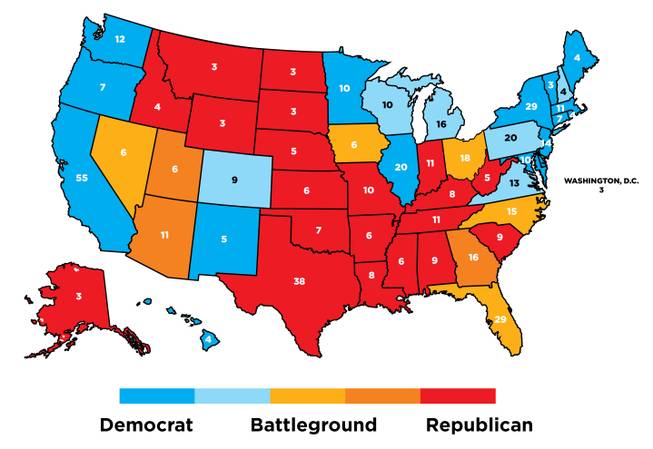
There are 74 electoral votes from so-called battleground states. States that at least lean Democratic represent 273 votes, while states that at least lean Republican represent 191 votes. If the map remains otherwise unchanged, Donald Trump would need to win every battleground state, plus flip a state such as Colorado or Wisconsin, in order to win the election.
All eyes are going to be on 2016’s swing states, where Clinton and Trump are polling so close that either could win. Nevada, Colorado, Iowa, Wisconsin, Michigan, Ohio, Pennsylvania, New Hampshire, Virginia, North Carolina and Florida are considered among those where it’s difficult to predict which candidate will win.
However, some states are bigger prizes than others because of the Electoral College system. Within it, U.S. citizens don’t directly cast their ballots for president, but rather elect representatives who then pledge their support for the candidates. There are 538 electors split among the 50 states based on the number of senators and representatives each has. A candidate needs 270 electors, an absolute majority, to win the presidency.
WHAT ABOUT THIRD-PARTY CANDIDATES?
To participate in the debates, candidates need to appear on enough ballots to ensure a mathematical chance of winning the election. They also need to show that they have at least 15 percent of the support of the national electorate, as determined by five national public opinion polls. That’s why Libertarian Party candidate Gary Johnson and Green Party candidate Jill Stein have been watching the polls closely.
The commission announced in August that it would use polls from CNN, Fox News, ABC News/Washington Post, NBC News/Wall Street Journal, and New York Times/CBS News to determine eligibility. Johnson is polling at 8.4 percent between the five polls, while Stein is around 3.2 percent — neither high enough to qualify for the first debate. The candidates still have a chance to qualify for the last two presidential debates.
Independent candidate Ross Perot was the last third-party or independent candidate to make it on the debate stage, in 1992. That year, the commission used recommendations from experts to determine who should appear.
THROUGH THE YEARS: MEMORABLE DEBATE MOMENTS
• Richard Nixon’s decision not to wear makeup in the first national presidential debate in 1960 proved to be fateful. Viewers thought he looked sweaty, and it didn’t help that he had fast-growing stubble, which made it appear he had serious five-o’clock shadow. And unlike John F. Kennedy, who gave his answers while looking straight into the camera, Nixon answered his questions by looking at off-camera reporters who’d asked them, making it appear he was being shifty.
• Debating Jimmy Carter in 1976, Gerald Ford intended to convey that the will of Eastern Europeans hadn’t been crushed by the Soviet Union. Here’s what he said instead: “There is no Soviet domination of Eastern Europe, and there never will be under a Ford administration.” The remark further fueled the perception that Ford was clumsy, both physically and mentally, and it only added to his challenges as an establishment candidate in the post-Watergate era.
• When vice presidential candidate Dan Quayle invoked Kennedy while debating Michael Dukakis’ running mate, Lloyd Bentsen, in 1988, Bentsen unleashed arguably the greatest smack-down line in debate history. “I served with Jack Kennedy. I knew Jack Kennedy. Jack Kennedy was a friend of mine. Senator, you’re no Jack Kennedy.”
• At 73, Ronald Reagan already was the oldest president in history when he faced Walter Mondale for re-election in 1984. Coming off of a weak performance in the pair’s first debate, which led to questions about whether Reagan’s age was affecting his ability to serve, Reagan used humor to deftly maneuver around the issue. “I will not make age an issue of this campaign,” he said. “I am not going to exploit, for political purposes, my opponent’s youth and inexperience.”
• Ross Perot’s running mate, Adm. James Stockdale, was speaking about his lack of political experience in a 1992 vice presidential debate when he said, “Who am I? Why am I here?” But the remark was widely interpreted as proof of a perception that Stockdale was old and mentally addled.
• As an audience member asked how the candidates had personally been affected by a sluggish economy in 1992, George H.W. Bush looked at his watch, then gave an awkward answer. Compared with Bill Clinton’s effective “I feel your pain” approach, the embattled Bush appeared impatient, uncaring and out of touch. “I was glad when the damn thing was over. Yeah,” Bush said in 2008. “And maybe that’s why I was looking at it: Only 10 more minutes of this crap.”
DEBATE FAQs from the Commission on Presidential Debates
How much do debates affect the election?
It’s difficult for political scientists to say a debate has the potential to swing the election one way or another, because few voters are undecided.
Still, a debate has the potential to push approval ratings a few percentage points one way or the other. In a tight election, that can mean the difference between winning and losing.
What is the media’s influence on the debate?
More important than the debates is the role the media plays in spinning them. A 2004 study led by Kim Fridkin at Arizona State University asked voters to watch a debate and say who they thought won: 25 watched without commentary; 25 watched with commentary from NBC News suggesting George W. Bush won; and 24 watched with commentary from CNN suggesting John Kerry won.
Of those who watched without commentary, 24 percent said Bush won and 48 percent said Kerry won. Of those who watched with NBC News commentary, 50 percent said Bush won and 17 percent said Kerry won. Of those who watched with CNN commentary, 19 percent said Bush won and 43 percent said Kerry won.
Q: Who oversees the debates?
A: The Commission on Presidential Debates, a nonprofit organization founded in 1987, was formed to ensure the American public had a chance to see the presidential candidates debate before Election Day and that the debate process became a permanent part of the election process. The commission has sponsored all presidential debates since 1988. The commission is funded independently through the communities that sponsor the debates and from corporate, foundation and private donors, none of whom have any say in the debate process.
Q: Who attends the debates?
A: The commission is in charge of choosing how many people can attend and how tickets are allocated. The universities where the debates are hosted are allocated a certain number of tickets to distribute to students or faculty. UNLV has said its priority was ensuring that current full-time students were given tickets and that tickets would not be generally available to the public through the university. For the town hall in St. Louis, audience members will be undecided voters selected by polling giant Gallup.
Q: Do the candidates know what they’re going to be asked?
A: No. The moderators of each debate select the questions, and the candidates aren’t supposed to have advance knowledge of them.
Q: What happens if a candidate goes over the time given to answer a question?
A: Moderators are allowed to extend certain segments to ensure a robust discussion, but they’re also supposed to be sure the candidates have equal speaking time.
Q: Can the moderator jump into the discussion?
A: Yes, but they’re only supposed to intervene in the conversation to shape a robust discussion.
Q: What happens during commercials?
A: There are no commercial breaks, so for those watching at home, best get all of your snacks prepared before it starts.
Q: I’ve heard of weird rules for the debates, such as dictating what kind of chairs should be used, if any. Where do we read about those?
A: The campaigns typically sign a Memorandum of Understanding, which establishes specific rules and protocols. One example: ensuring that the green rooms for the two candidates are of equal distance from the debate stage. The MOU between Barack Obama and Mitt Romney’s campaigns was released to the public in 2012, but that usually isn’t the case. The MOU also isn’t technically binding on the commission.
Q: Are the people who sit in the debate hall allowed to clap and cheer?
A: Jim Lehrer, who has moderated numerous presidential debates, famously told audience members, “If you don’t do what I say, if you cheer or anything like that, I’m going to stop the debate, and I’m going to take the time out of the guy you’re cheering for.” To that end, moderators typically instruct the audience at the start of the debate not to demonstrate any support or opposition to the candidates through clapping, cheering, yelling or gasping. So yes, if you’re one of the lucky UNLV students invited to attend the debate in person, best leave that vuvuzela at home. Save your chatter for Twitter.
Q: What about the dates for the debate? Don’t those conflict with NFL games?
A: Yes, two of the presidential debates do conflict with NFL games. The first debate will air at the same time as a Atlanta Falcons-New Orleans Saints game. The second, the town hall, will air during the New York Giants-Green Bay Packers game. However, the debate schedule was announced in September 2015, six months before the 2016-17 NFL schedule was unveiled, and the commission has said it would not move the dates now because any alternate dates could conflict with holidays, Major League Baseball playoff games and other sporting events.
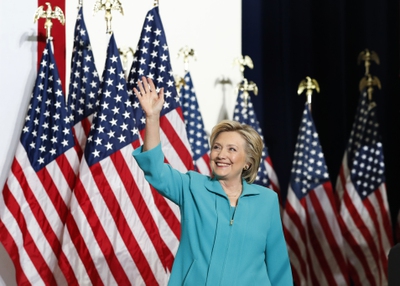
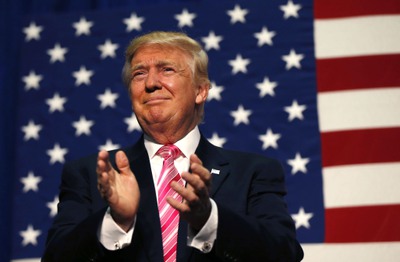
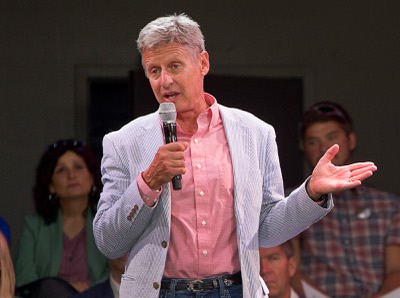
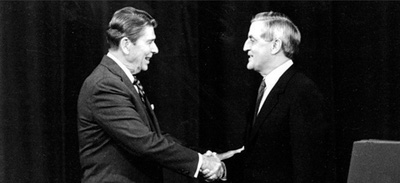

Join the Discussion:
Check this out for a full explanation of our conversion to the LiveFyre commenting system and instructions on how to sign up for an account.
Full comments policy